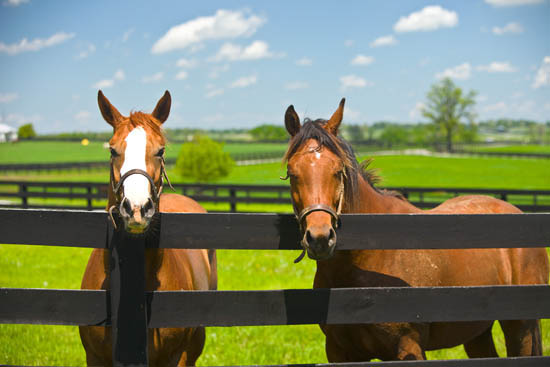KY Equine Survey--final fundraising push
KY Equine Survey--final fundraising push

Published on Jul. 25, 2012
As the 2012 Kentucky Equine Survey enters the final stages of data collection, a second and vitally important piece of the project intensifies. The deadline is a little more than a month away for the project to secure funds from the state’s equine industry in order to receive matching funding from the Kentucky Agricultural Development Fund.
The University of Kentucky‘s Ag Equine Programs and the Kentucky Horse Council have partnered on the 2012 Kentucky Equine Survey, a statewide comprehensive survey of all breeds of horses. The study is being conducted in conjunction with the University of Louisville's Equine Business Program and the Kentucky field office of the U.S. Department of Agriculture National Agricultural Statistics Service. The last comprehensive study of this type was conducted in 1977.
“We just crossed over the halfway point of raising $100,000 from Kentucky’s equine industry, and wholeheartedly thank our industry partners who have led these efforts,” said Jill Stowe, associate professor in agricultural economics at UK and project lead. “Our Sept. 1 deadline for raising the remaining funds is coming quickly, and we are looking for other industry partners to step up and help this important project reach its full potential.”
“This study is critical to every horse activity in Kentucky and will create a rich and unbiased set of data that should be a foundation for decisions by policymakers, educators, investors and business leaders for many years to come,” said Nancy Cox, associate dean for research in UK’s College of Agriculture, Kentucky Agricultural Experiment Station director and administrative leader for UK Ag Equine Programs.
The cost of the study is $600,000. The Kentucky Agricultural Development Fund committed $300,000 to the project, with $100,000 of that funding contingent on a match of $100,000 from Kentucky’s horse industry and organizations. The UK College of Agriculture committed $200,000 for the study.
The bulk of the budget goes to the Kentucky field office of the National Agricultural Statistics Service, an agency that conducts this type of research regularly and is able to provide the highest level of confidentiality to participants.
Early financial support for this effort has come from the Kentucky Horse Council, Kentucky Quarter Horse Association, North American Equine Ranching Information Council, Kentucky Thoroughbred Association/Kentucky Thoroughbred Owners and Breeders and Kentucky Thoroughbred Farm Managers Club. Additional financial support has been given or pledged by Alltech, Equine Medical Associates, Farmers Feed Mill, Keeneland, Kentucky Association of Equine Practitioners, Kentucky Dressage Association, Kentucky Equine Education Project, McMahon & Hill Bloodstock, LLC, Mountain Pleasure Horse Association, Northern Kentucky Horse Network, Sierra Farm and Webster Pharmaceuticals. Additionally, the Kentucky Horse Council continues to raise money through a grassroots campaign where private horse owners donate $10 on behalf of their horse. Personal donations have also come from Mary Anne Cronan, Lisa Lourie, Norm Luba and Nancy Stephens.
“We are grateful to all of the individual donors who have thus far given to this project, whether the amount was large or small,” said Ginny Grulke, executive director of the Kentucky Horse Council. “Every dollar donated results in $2 going towards the survey. Donations are also tax-deductible, a financial bonus for the horse owner.”
The survey, mailed in June to 15,000 Kentucky horse owners, is now due. Horse owners who have not completed and mailed in their information are urged to get it in quickly. Representatives from the National Agricultural Statistics Service will begin to make phone calls to those who haven’t yet submitted their information.
The purpose of the study is to get an accurate inventory of all horses in the state by breed and use, and to describe their economic impact at the farm and community levels, through races, shows, trail rides and other events. The survey requests information relating to capital investments on the farm and in farm equipment in order to better assess the full economic value of Kentucky’s horse industry. Horses being inventoried include those on farms owned by the horse owner as well as those boarded at equine boarding and breeding facilities.
The survey asks for information about breeds, their uses and their estimated value. Other questions include the number and value of horses sold or purchased in 2011 as well as approximate expenses for horse care, including wages, taxes, feed, bedding, health, supplies, farrier, insurance, boarding and training fees.
All farm and individual names are confidential and will not be available to any state or federal agency, nor to UK, U of L or the Kentucky Horse Council. Summary results from the survey are expected in December, with in-depth economic impact results becoming available during early 2013.
More information about the 2012 Kentucky Equine Survey can be found at http://www2.ca.uky.edu/equine/kyequinesurvey or on Kentucky Horse Council’s website at http://www.kentuckyhorse.org/.
Community Development Economics Equine

